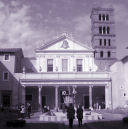» Enjoy our Liturgical Seasons series of e-books!
In certain ways the Lenten Christian is like the Jew in exile. He is still exposed to the attacks of the enemies. Lent, like the exile in Babylon, is a time of cleansing. It intends to create in us a greater desire and longing for deliverance which God has promised us through our Savior Jesus Christ. All the chants and prayers in today's Mass are urgent pleas for God's mercy and help. — St. Andrew Bible Mission
Meditation - The Faults of Our Neighbor
In disagreements between you and your neighbor, you must always remember that to be in the right is the consideration that influences a Christian the least. The philosopher may indulge such a satisfaction. But to be in the right and to act as if one were not, to allow one's opponent to triumph on the side of injustice,-this means to overcome evil by good, and to secure peace for one's soul. No more convincing argument for your own vindication is required than the silent exterior acknowledgment that you are in the wrong. He who edifies does more for the truth than he who is zealous for the combat. Instead of trying to refute those that are in the wrong, it is better to pray for them. A stream flows much more rapidly when nothing is done to hold it back. Pray for those who are prejudiced against you, never become embittered against them, pity them, await their return to better feelings, and help to free them from their prejudices. One would not be human if he does not feel how easy it is to stray, and how much it costs to acknowledge this. The spirit of meekness, of indulgence, of patience and humility in examining the behavior of others toward us, secures us that peace of mind which is not compatible with the jealous, suspicious sensibilities of self-love. — Fénelon
Things to Do:
- Your children may want to spend their Saturday afternoon learning about different local charitable organizations or needy families to whom the alms from the family's Lenten Jar will be given.
- Read this thought-provoking article by George Rutler, Why We Need Lent, to understand why such a season of mortification is necessary for us to become saints.

The Station is at the church of St. Cecelia where the Saint lived and was martyred and where her body now rests. The first church on the site was built in the 3rd or 5th century, and the baptistery from this church was found during excavations, situated underneath the present Chapel of Relics. A house from the Imperial era was also found, and tradition claims that the church was built over the house in which St Cecilia lived. This house was one of the tituli, the first parish churches of Rome, known as the titulus Ceciliae.





